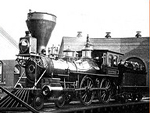Intertwined Development: Railroads and Political Parties
Question

How did railroads affect the political systems in 1870-1914?
Answer
Railroads and the political system have been intertwined since the first rail systems in the 1830s and 1840s when in the name of “internal improvements” the Whig Party supported government funding for start-up railroad companies. It was, however, during its rapid expansion in the post-Civil War era that the industry’s ties to the political system became controversial.
The federal government gave railroad companies thousands of acres of land on which to run their tracks. Men like Jay Gould, Cornelius Vanderbilt, E. A. Harriman, James J. Hill, and J.P. Morgan controlled a powerful industry. They wielded political power, too, by demanding the federal government send troops in to break up railroad strikes in 1877 and 1894. Meanwhile farmers began to protest the railroad’s monopoly over transportation rates. Congress responded with the Interstate Commerce Act (1887), which sought to prevent “pools” of interests from dominating industries. But given that both Republican and Democratic leaders benefited from gifts given by the railroad companies, real reform, it seemed, was going to have to come from outside the two-party system.
The People’s Party, or the Populists, emerged in the 1890s calling for strict regulation to rein in railroad companies’ power. By the early 1900s, self-styled “progressives” in both parties had picked up on the Populists’ and organized labor’s attacks on the railroads. During Theodore Roosevelt’s presidency, progressive Republicans and Democrats joined forces to pass the Elkins Act (1903), the Hepburn Act (1906) and, during William Howard Taft’s term as president, the Elkins-Mann Act (1910) and the Railroad Valuation Act (1913) all of which regulated the industry. Conservative Republicans pushed back by denying Roosevelt the nomination in 1912, thus causing a rift in the party and guaranteeing Woodrow Wilson’s election.
For more information
Central Pacific Railroad Photographic Museum Connolly, Michael J. Capitalism, Politics, and Railroads in Jacksonian New England (Columbia: University of Missouri Press, 2003). Martin, Albro. Railroads Triumphant (Oxford: Oxford University Press, 1992). Stover, John F. American Railroads (Chicago and London: The University of Chicago Press, second edition, 1997). Summers, Mark W. Railroads, Reconstruction, and the Gospel of Prosperity (Princeton, New Jersey: Princeton University Press, 1984.
Bibliography
Martin, Albro. Railroads Triumphant (Oxford: Oxford University Press, 1992).
The National Atlas of the United States of America. "Presidential Elections 1908-1920." Last modified August 03 2010.
